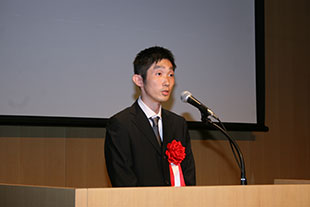 The Winner of the 14th Asia Pacific Research Prize (Iue Prize):
The Winner of the 14th Asia Pacific Research Prize (Iue Prize):
Dr. Noriyuki Osada
Title of Dissertation :
“From an Indian City to the Capital of Burma: The Emerging State Border in Colonial Rangoon, c.1850-1930”
- Dr. Noriyuki Osada
-
- Career -
Noriyuki OSADA is a research fellow of the Institute of Developing Economies, Japan External Trade Organization (IDE-JETRO). After graduating from the Faculty of Letters, the University of Tokyo, in 2004, he received M.A. and Ph.D. degrees respectively in 2006 and 2013, both from the Graduate School of Humanities and Sociology, the University of Tokyo. From 2007 to 2009, he studied in Myanmar as a scholarship student of the Mizuho International Foundation. He was a research fellow of Japan Society for the Promotion of Science (DC2) (2009-2011), a part-time analyst of the Ministry of Foreign Affairs (2011-2012), a research associate of IDE-JETRO (2013-2015).
- Summary -
Since independence in 1948, the nation-state of Burma/Myanmar has been imagined as an assemblage of “indigenous national races”. People considered “foreign” have been excluded from it. Being the fundamental framework of the state, this discrimination between “indigenous” and “foreign” continues to strongly mandate that country’s society even today. This dissertation pursues the colonial origin of these circumstances. It examines various immigration policies in Rangoon/Yangon, the capital city of Burma in the British colonial period, especially from the late 19th century to the early 20th century, and looks at the process of how the state border or the categories which demarcate the territory of Burma emerged. Specifically examined is the practical response of colonial authorities to urban problems in three areas of administration: public health, policing, and town planning. In the colonial period (precisely up to 1937) Burma was a local administrative entity, namely a province, within British India. In the province of Burma a vast number of immigrant labourers from the Indian subcontinent were indispensable to the development of the colony and the empire, so it was considered that immigration should remain free and unrestricted. On the other hand, from the viewpoint of the local governance of the province, some kind of control measures were regarded as necessary because unrestricted immigration tended to be accompanied by threats such as epidemics and crime. British administrators in the local government of Burma, while maintaining the quantity of labour immigration, gradually institutionalized and practiced immigration control policies in Rangoon. The dissertation describes this process as one aspect of the phenomena by which the territory of colonial Burma became that of an individual state separate from India. The institutionalization of immigration controls was also the process of how colonial Rangoon, a cosmopolitan and plural society open both to the international market and its own hinterlands, was incorporated into the closed framework of the state of Burma as its capital city. In addition, this dissertation seeks to write a social history of the city by focusing on the influence that the above-mentioned changes had on urban residents, and suggests that the policies of the local colonial government sometimes promoted an exclusive form of nationalism and possibly deepened the cleavage among ethnic groups in the urban society.
 The Winner of the 14th Asia Pacific Research Prize (Iue Prize):
The Winner of the 14th Asia Pacific Research Prize (Iue Prize): 






